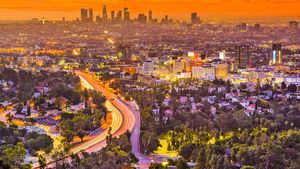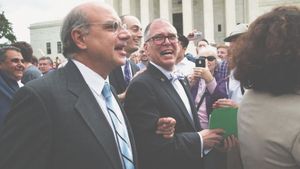Democrat Barack
Obama is calling for sharply reducing U.S. greenhouse gas
emissions and forcing power companies and other businesses
to pay for all of their pollution.
He said Monday
that he would get results, unlike those who he said are
bound by the unwritten rules and timidity of Washington
politics.
''Our energy
problem has become an energy crisis because no matter how
well-intentioned the promise, no matter how bold the
proposal, they all fall victim to the same Washington
politics,'' Obama said.
He spoke at the
new, energy-efficient Portsmouth Public Library in New
Hampshire, where about 100 invited guests watched a short
video featuring every president since Gerald Ford
promising to curb the use of fossil fuels --
contrasted with a graphic illustrating the nation's
increasing dependence on foreign oil. Obama suggested
his rivals for the Democratic nomination would provide
more of the same.
''There are some
in this race who actually make the argument that the
more time you spend immersed in the broken politics of
Washington, the more likely you are to change it,'' he
said. ''I find this a little amusing.''
Obama, who has
been working to overcome suggestions that he's too
inexperienced to be president, said those with long
Washington careers have failed to act on issues such
as higher fuel economy standards for cars and trucks.
''When they had
the chance to stand up and require automakers to raise
their fuel standards, they refused. When they had multiple
chances to reduce our dependence on foreign oil by
investing in renewable fuels that we can literally
grow right here in America, they said no,'' he said.
''As president, I
will set a hard cap on all carbon emissions at a level
that scientists say is necessary to curb global warming, an
80% reduction by 2050,'' he said.
He proposed a
modified ''cap and trade'' approach to reduce emissions,
requiring businesses to buy allowances if they pollute,
creating an incentive to reduce energy usage.
''No business
will be allowed to emit any greenhouse gases for free,'' he
said. ''Businesses don't own the sky, the public does, and
if we want them to stop polluting it, we have to put a
price on all pollution.''
Sen. Hillary
Rodham Clinton has said she is intrigued by the carbon
auction system but has stopped short of endorsing it. Sen.
Chris Dodd of Connecticut has proposed taxing
polluters for their carbon emissions.
Separate from the
energy proposal, Obama joined rival John Edwards Monday
in criticizing Clinton for voting for a Senate resolution
that urges the State Department to designate Iran's
Revolutionary Guard Corps a terrorist organization.
Edwards has said
the resolution, which won overwhelming bipartisan
support late last month, could give President Bush the
authority to take the first step to war with Iran. New
Mexico governor Bill Richardson also has criticized
Clinton's vote.
Obama joined them
Monday.
''Senator Clinton
and others should have learned from 2002 that if you
give President George Bush a blank check that he'll cash
it,'' the Illinois senator told the Associated Press
after a campaign stop in Nashua. The reference was to
the vote in Congress authorizing the use of force
against Iraq.
''You've got to
be very cautious and very sober regarding any kind of
language or rationale that leads him to make more disastrous
foreign policy decisions,'' said Obama. He did not
vote on the Iran resolution because he was campaigning
in New Hampshire.
Kathleen Strand,
a spokeswoman for Clinton's campaign, responded, ''It's
unfortunate that Senator Obama is abandoning the politics of
hope and embracing the same old attack politics as his
poll numbers start falling.''
On energy, Obama
proposed using $150 billion from the sale of allowances
to stimulate climate-friendly energy and economic
development. Included would be developing the next
generation of biofuels and fuel delivery
infrastructure, accelerating commercial production of
plug-in hybrid vehicles, promoting larger-scale
renewable energy projects and low-emission coal
plants, and making the electricity grid digital.
He also called
for making government, businesses, and homes 50% more
energy-efficient by 2030, with all federal government
buildings carbon neutral by 2025. Incandescent
lightbulbs would be phased out by 2014, a measure
Obama estimates would save consumers $6 billion a year on
their electric bills.
''We are glad to
see Senator Obama join this critical debate about how we
keep our planet clean for generations to come,'' said Kate
Bedingfield, a spokeswoman for Edwards, who several
months ago released his plan to reduce greenhouse gas
emissions at least 80% by 2050. Edwards would auction
off a portion of the pollution permits and invest the
proceeds on renewable energy technology and new jobs,
while other permits would be sold or given away.
(Holly Ramer, AP)














































































